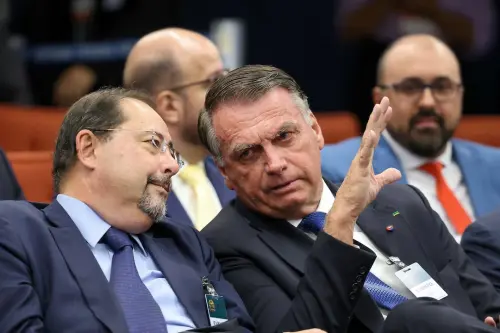A five-judge panel from Brazil's Supreme Court began deliberations to determine if former President Jair Bolsonaro and some of his closest aides should face trial for allegedly attempting a coup after his 2022 electoral defeat.
The judges are expected to decide by Wednesday whether to proceed with the case against the former leader, who is accused of plotting to overthrow the government.
A ruling on the charges this week, if it occurs, would mark an unusually rapid decision for a court historically known for prolonged deliberations. A criminal case involving numerous politicians over a decade ago took the Supreme Court months to accept charges after they were presented.
A swift ruling on these charges could suggest that the court "may conclude the trial before the end of the year," according to Ivar Hartmann, a law professor at Sao Paulo's Insper business school. This timeline would preclude a ruling in the lead-up to Brazil's next presidential election in late 2026.
Despite facing growing legal challenges, Bolsonaro maintains his intention to run for office again. In 2023, a federal electoral court barred him from holding public office until 2030 due to his abuse of political power to undermine Brazil's voting system during the 2022 presidential campaign.
The charges of attempted coup, filed by Prosecutor General Paulo Gonet last month, allege that a group led by Bolsonaro "sought total control over the three branches of government."
Bolsonaro's lawyers have stated that he never supported any actions aimed at dismantling Brazil's democratic institutions. The former president has denied any wrongdoing and described the case as politically motivated.
"I hope for justice. There is no basis for the biased accusations made by the federal police," Bolsonaro told reporters in Brasilia before heading to the court session.
Many of Bolsonaro's allies doubt that the panel, which comprises nearly half of the court's full bench, will refuse to hear the case against him. The panel consists primarily of justices known for their strict stance on the excesses of the hard-right movement associated with Bolsonaro.
Lawyers for the former president filed a petition requesting that the case be heard by the Supreme Court's full bench of 11 justices, including two appointed by Bolsonaro, but the request was denied.
This phase of proceedings requires a lower evidentiary threshold since judges are not determining the merits of the case, but rather whether there are sufficient grounds to proceed with evidence collection, according to Hartmann.
The charges against the former president followed a two-year police investigation and involve 33 other individuals, including several high-ranking military officials.
They face accusations of five crimes, including a violent attempt to abolish democratic rule, coup d'état, and damage to government property.
Investigators allege that the group's plans included poisoning President Luiz Inacio Lula da Silva and targeting the judge overseeing the case.
Bolsonaro's lawyers contended that Moraes, as an alleged victim of the plot, should not adjudicate the case, but they were unsuccessful in persuading the court.
If convicted, Bolsonaro could face significant prison time. Eloisa Machado, a law professor at Fundação Getulio Vargas in Sao Paulo, noted that an assessment of the convictions of participants in recent anti-democratic activities suggested that Bolsonaro might receive a sentence exceeding a dozen years.
As part of the proceedings, the court will also hear charges this week against Bolsonaro's former justice minister, Anderson Torres, former Defense Minister Paulo Sergio Nogueira, and former Chief of Staff Walter Braga Netto, who was also his running mate in the 2022 election.
